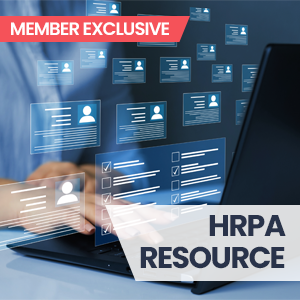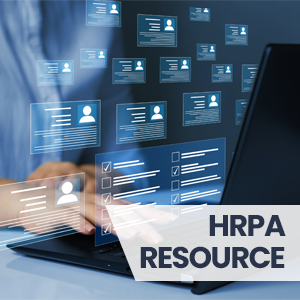Search
Tags
Resource Type
Topic
Sub Topic

HR Trends
HRPA 2023 Trends Survey
HRPA’s annual trends survey and benchmarking report.

HRPA Resource, Learning & Development
Training & Professional Development Reimbursement Policy

HRPA Resource, Total Rewards & Compensation
Pregnancy & Parental Leave Top-Up Program Policy


Health & Wellness, HRPA Resource
Health and Wellness Benefit Policy
The purpose of this document is to help your organization implement a flexible health and …

Health & Wellness, HRPA Resource
Scent Free Workplace Policy
Implementing a Scent Free Policy is a step your organization can take towards creating an …

Employment Law, Occupational Health & Safety
Government of Ontario – COVID-19 and workplace health and safety
Workplace health & safety information.

Employment Law, Occupational Health & Safety
CCOHS – Respiratory Infectious Diseases: Health and Safety Resources
Workplace health & safety information.

Employment Law, Human Rights
OHRC – OHRC Policy statement on COVID-19 vaccine mandates and proof of vaccine certificates
Human rights information at the provincial level.

Health & Wellness, HRPA Resource
The Evolution of Workplace Mental Health in Canada
HRPA sponsored research about the evolution of mental health strategies in the workplace.

Employment Law, Human Rights
OHRC – Policy statement on a human rights-based approach to managing the COVID-19 pandemic
Human rights information at the provincial level.

HRPA Resource, Talent Management
Apprenticeship Reform: Ontario’s future depends on it
HRPA makes a series of recommendations for reforming Ontario’s College of Trades and promoting skilled …
The resources on this page are intended for general information purposes only and are not to be taken as legal advice or endorsement by HRPA. While we make every effort to keep these resources updated, resources supplied by third parties may change and HRPA cannot guarantee that the links on this page reflect the latest information available, nor can we guarantee the accuracy of information provided by third parties.